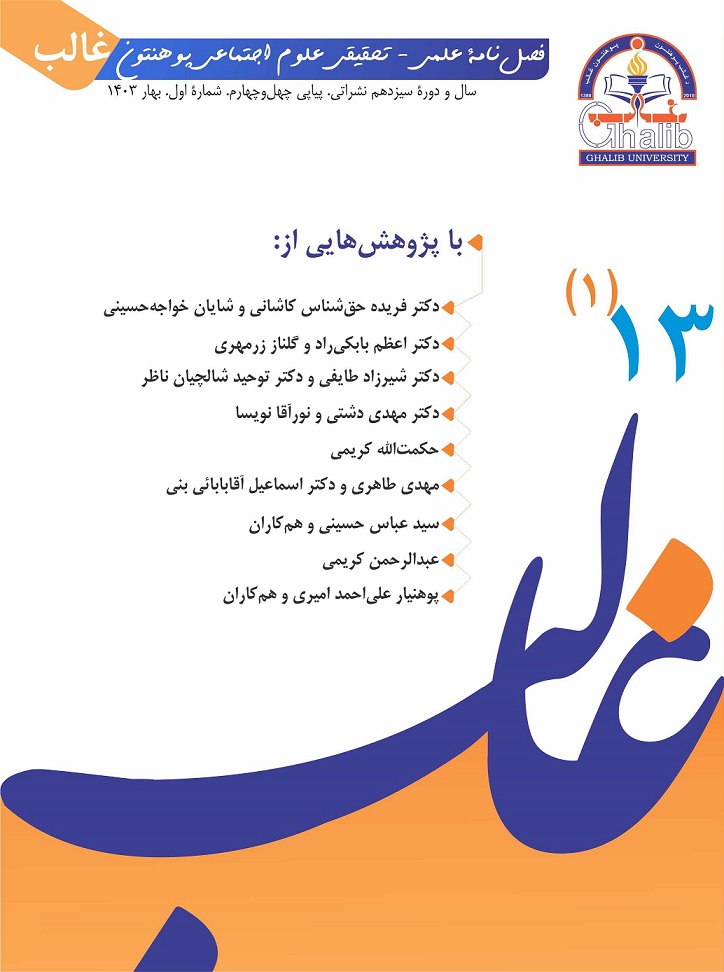Indicators of Islamic Awakening in Khalilullah Khalili’s Poetry
DOI:
https://doi.org/10.58342/ghalibqj.V.13.I.1.4Keywords:
Downfall, Mosleman, Khalilullah Khalili, Islamic Awakening, Islamic UmmahAbstract
Islamic awakening is a movement of vigilance and awareness among Islamic community, during which, after a prolonged period of Intellectual regression, declination, and imitation of West, Muslims renewed the thought and resisted to gain enormity and control over affairs of Islamic lands. Studying role of Khalilullah Khalili a contemporary poet from Afghanistan in Islamic awakening and investigation of such awakening indicators in his poems, show that Khalili had a dominant role in revival of religious thoughts, creation of unity, self-esteem, and spirit of Muslims’ return to their olden enormity. The aim of present paper is introducing Khalilullah Khalili, s describing role of his poetry in awakening of Persian-speaking Islamic society and investigation of the most important indicators of Islamic awakening in his poetry. The present research will answer such questions as what are the indicators of Islamic awakening and how are these indicators reflected in Khalilullah Khalili’s poetry? This research, conducted with an analytical-descriptive approach, utilizes reputable literary and literary criticism sources to explain parameters of Islamic awakening and example of Khalilullah Khalili’s poetry have been described as witness of the discussion. In Khalili's poetry, numerous indicators and signs of Islamic awakening and his attention to the revival of lost Islamic values and the glorious past of the Islamic community can be found. Among the most notable indicators are the promotion of the idea of global Islamic unity, the call for Muslim unity, condemnation of various forms of division, anti-colonialism, advocating the establishment of the duty of jihad, strengthening self-confidence and self-belief among Muslims, instilling hope for a bright future, calling for a return to the Quran and Its liberating message, renewing Islamic thought, and combating superstitions resulting from the period of decline.
References
قرآن کریم.
البنا، حسن. (۱۳۹۴). رسایل (دعوت ما، آنچه مردم را بدان فرا میخوانیم و از دیروز تا امروز). ترجمۀ مصطفی اربابی. کابل: اصلاح افکار.
چهرقانی، رضا؛ اسماعیل، شفق. (۱۳۹۳). خلیل الله خلیلی؛ شاعر بیداری و پایداری. مجلۀ ادبیات پارسی معاصر. پژوهشگاه علوم انسانی و مطالعات فرهنگی. 4(2). ۳۱ – ۵۱.
خلیلی، خلیل الله. (1385). دیوان خلیل الله خلیلی. به کوشش محمدکاظم کاظمی. تهران: عرفان.
دهخدا، علی اکبر. (۱۳۷۷). لغتنامه. تهران: دانشگاهِ تهران.
رزمجو، حسین. (۱۳۸۲). نقد و نظری بر شعر فارسی از دیدگاه اخلاقی. مشهد: دانشگاه فردوسی.
زرینکوب، عبدالحسین. (۱۳۷۵). از گذشتۀ ادبی ایران. تهران: الهدی.
زرینکوب، عبدالحسین. (۱۳۸۱). شعر بیدروغ، شعر بینقاب. چ 9. تهران: علمی.
غزالی، محمد. (۱۳۸۱). نگرشی نو در فهم قرآن. ترجمة داود نارویی. تهران: احسان.
قرضاوی، یوسف. (۱۴۱۸ هـ. ق). الصحوة الاسلامیة و هموم الوطن العربی و الاسلامی. قاهره: دارالشروق.
قرضاوی، یوسف. (۱۳۷۸ هـ. ش). بیداری اسلامی و فرهنگ اختلاف. ترجمۀ عمر قادری. سنندج: عمر قادری.
قلعچی، قدری. (۱۳۸۴). حکیم مشرقزمین، سید جمال الدین افغان. ترجمۀ عبدالواحد نهضت فراهی. کابل: میوند.
قویم، عبدالقیوم. (1387). مروری برادبیات معاصر دری از 1259 تا 1380 ش. کابل: سعید.
لاهوری، محمداقبال. (۱۹۹۰ م). کلیات اشعار فارسی اقبال. به اهتمام اکادمی اقبال. لاهور: استقلالپریس.
مصطفی، ابراهیم و دیگران. (۱۹۸۹ م). المعجم الوسیط. استانبول: دارالدعوة.
مودودی، ابوالاعلی. (۱۳۹۲). دعوت و دعوتگر. ترجمۀ عبدالعزیز سلیمی. تهران: احسان.
نقوی، علی محمد. (۱۳۷۷). جامعهشناسی غربگرایی. ج ۱. تهران: امیر کبیر.
References
The Holy Quran (in Arabic).
Al Banna, Hasan. (2015). Essays (Our invitation, what we call people for and from Yesterday to Today), translated by Mustafa Arbabi. Kabul: Eslah-e-Afkar. (Persian).
Chehrqani, Reza and Ismail Shafaq. (2024). Khalilullah Khalili, poet of awakening and resistance. Journal of Contemporary Persian Literature, research center for humanitarian sciences and cultural studies, 4th year, 2nd volume, summer 2014, pp. 31-51. (Persian).
Khalili, Khalilullah. (2006). Poetical work of Khalilullah Khalili. By effort of Mohammad Kazem Kazemi. Teharan: Erfan. (Persian).
Dehkhuda, Ali Akbar. (1998). Dictionary. Tehran: Tehran University. (Persian).
Razmjo, Husain. (2003). A Criticism and Theory on Persian Poetry from Moral Perspective, volume 1, Mashhad: Firdausi University. (Persian).
Zarinkub, Abdul Husain. (1996). From Olden Literary of Iran. Tehran: Alhoda. (Persian).
Zarinkub, Abdul Husain. (2002). Truthful and uncovered poem. Tehran: Alhoda. (Persian).
Ghazali, Mohammad. (2002). A New Theory on Understanding of Quran. Translated bu Dawod Naroyi. Tehran: Ehsan. (Persian).
Qarzawi, Yusuf. (1996). Islamic Awakening and Depressions of Arabic and Islamic homeland. Cairo: Darul Shroq. (Arabic).
Qarzawi, Yusuf. (1999). Islamic Awakening and Culture of Disagreement. Translated by Omar Qaderi. (Persian).
Qalachi, Qadri. (2005). Eastern Philosopher Saye Jmaluddin Afghan. Translated by Abdul Wahed Nahzat Farahi. Kabul: Maiwand. (Persian).
Qawim, Abdul Qayum. (2008). A Review of Dari Contemporary Literature from 1980 to 2001. Kabul: Saied. (Persian).
Lahori, Iqbal. (1990). Poetical Work of Iqbal. By effort of Iqbal’s Academy. Lahore: Isteqlal press. (Persian).
Mustafa, Ibrahim & Others. (1989). The Medium Dictionary. Istanbul: Darul Dawah. (Arabic).
Mawdudi, Abulala. (2013). Invitation and inviter. Translated by Abdul Aziz Salimi. Tehran: Amir Kabir. (Persian).
Naqawi, Ali Mohammad. (1998). Sociology of Westernization, volume 1. Tehran: Amir Kabir. (Persian).
Downloads
Published
How to Cite
Issue
Section
License
Copyright (c) 2024 دکتر مهدی دشتی،نورآقا نویسا

This work is licensed under a Creative Commons Attribution 4.0 International License.













